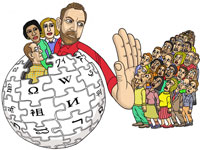Media Hegemony The assumption of media hegemony is that the ideas of the ruling class become ruling ideas in society. According to this approach, the mass media are controlled by the dominant class in society which uses it as a vehicle for exerting control over the rest of society. Media hegemony is rooted in the Marxist economies.They argue that media contents in USA are shaped to suit the interests of the capitalists. While commenting on media hegemony, Adelheid says that it seems to involve at least three assumptions that could be treated with evidence: The socialization of journalists involves guidelines, work routines and orientations replete with the dominant ideology. Journalists tend to cover topic and present news reports that are conservative and supportive of the status quo. Journalists tend to present pro-American and negative coverage of foreign countries, especially Third World nations. According toWerner J. Severin and James W. Tankard […]
Gate Keeping in Media
Gate Keeping The term gatekeeping was originally used by Kwrt Lewin in his Human Relations (1947) to refer to (1) theprocess by which a message passes through various gates as well as (2) thepeople or groups who allow the message to pass (gatekeepers), may be individualsor a group of persons through whom a message passes from sender to receivers. A camera-person is a vivid example of a gatekeeper, who selects certain area for photographing which are then shown to the viewers. Editors of newspapers,magazines and publishing houses are also gatekeepers as. they allow certain information to get through and filter other information. The selection and rejection ofmaterial is made according to a set of criteria determined by a number of factors such as the gatekeepers, back-ground, education, up-bringing and attitudes to the world plus the values, norms and traditional Wisdom of the organisation for which the gatekeeper works. History and […]
Normative Theories of mass communication
Explainnormative theories of mass communication. · Professionalism, a crusade toclean up the media and make it respectable and credible, followed the era ofyellow journalism; its objective was to eliminate shoddy and irresponsiblecontent. · Media professionals and socialelites used normative theory to answer questions regarding media reform. Social responsibility is the normative theoryused in the United States. · Social responsibility theory The Origins of NormativeTheories of Media Ø Twoopposing viewpoints o Radical libertarians (FirstAmendment absolutists) & Technocratic Control § First Amendment absolutiststake the idea of “free press” as literal and oppose government regulation. § Technocrats do not trust themedia and believes in the use of regulators to act in the publicinterest. o Propaganda and mass societytheories are used to justify media regulation. Normative theory: The type of theory that describes an ideal way for media systemsto be structured and operated. Normative theories: 1. Authoritarian theory The theory that places all forms of communication under thecontrol of governing elites […]
types of communication and its effects
Elaborate with example the various types of communication and its effects in various situations. Communication Communication is a process of exchanging information, ideas, thoughts, feelings and emotions through speech, signals, writing, or behavior. In communication process, a sender(encoder) encodes a message and then using a medium/channel sends it to the receiver (decoder) who decodes the message and after processing information, sends back appropriate feedback/reply using a medium/channel. TYPES OF COMMUNICATION There are five types of communication 1. Interpersonal Communication Communication that takes place within himself or herself is called intrapersonal communication. Conversation with self and planning or thinking about the schedule of your study for an examination etc. are the examples of intrapersonal communication. 2. Interpersonal Communication It is the process in which communication takes place between two or a small group of persons. Interpersonal communication always takes place into a face to face situation and the communicator and destination […]
Explain physical and psychological hurdles of communication?
Barrier/ Hurdle: Barrier means all those hurdles which stop or interrupt the process of communication. Barrier sometimes becomes so strong that they can even make the whole process just a failure. Hurdles of Communication: Physical barrier is a problem in the way of transmitting a message from its source to destination. You sent a letter to your friend but he didn’t get it, this is a physical barrier; there is a speech of President on TV but you can’t listen it properly due to some problem in the transmission (channel noise), also a physical hurdle. If a student closes a door with noise during lecture then it would also be a physical hurdle. Transmitting a message from one person to another is a tough job because there is a possibility of misunderstanding. There is very little chance that the reader will understand exactly the same what the writer means. […]
Define communication. Elaborate different elements of communication?
Communication: The word communication has originated from a Latin word “Communes” which means something common. Therefore, when we communicate, we are indeed trying to establish commonness of thoughts or feelings with other individuals. In other words, communication is a process of sharing ideas, words and attitudes, with someone. It is a basic human need. As human being we need somebody to help us, talk to us, hear to us. One of the renowned Greek Philosopher has said that a man who says that he does not need anybody is either god or a beast. The phenomenon of communication is the natural desire of human being to express his/her feelings and ideas to others. The basic purpose of communication is to bring changes in the behaviour of the receiver. The basic purpose of communication is to inform, educate and entertain people. Different scholars have defined communication differently. However, some of the […]
